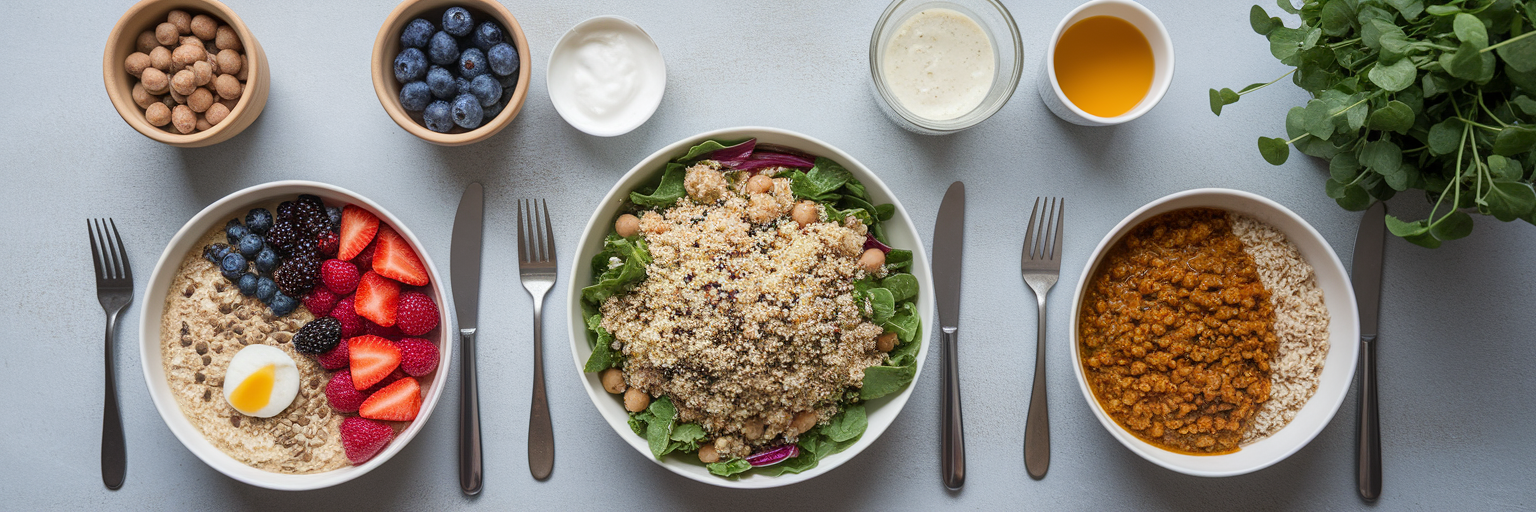Understanding Protein's Role in Muscle Repair
We can all picture that moment. The final rep is done, and a frantic rush begins to mix and drink a protein shake before the "window" closes. While protein is absolutely essential for recovery, the urgency we attach to its timing is often built on outdated gym lore. The real power of vegan protein for muscle recovery lies in understanding how your body actually works.
Every workout creates tiny micro-tears in your muscle fibres. This is a good thing. It is the signal for your body to begin the repair process, known as muscle protein synthesis (MPS). Think of it as a construction crew arriving to rebuild a structure stronger than it was before. Protein provides the essential building blocks, or amino acids, that this crew needs to do its job effectively.
This article will move past the myths and provide a clear, flexible strategy. We will explore how to use vegan protein to support this natural repair cycle, helping you get results without the unnecessary stress.
The Myth of the Anabolic Window

For years, fitness culture has been dominated by the anabolic window myth. This is the idea that you have a strict 30 to 60 minute period after your workout to consume protein for it to count towards muscle growth. If you miss it, the theory goes, you have wasted your workout. This belief created a generation of gym-goers who would sooner skip their cooldown than their immediate post-workout shake.
However, modern science tells a different story. While your muscles are certainly primed for repair after exercise, the window of opportunity is much larger than we thought. In fact, as a 2024 study published in the Journal of Sports Nutrition found, muscle protein synthesis can remain elevated for up to 24 hours post-exercise. This single insight changes everything.
What does this mean for you? It means freedom. It means you can breathe, shower, and head home without panicking. Having a shake right after training is perfectly fine if it suits your routine, but it is not a make-or-break requirement for progress. The focus should shift from a frantic, short-term rush to a consistent, day-long approach to recovery. This is about building sustainable habits, not adhering to rigid, stressful rules. After debunking this common myth, you can discover more evidence-based fitness insights on our blog.
Pre-Workout Versus Post-Workout Protein Intake
Now that we have established the anabolic window is more of a wide-open door, the question becomes: is there an advantage to taking protein before versus after a workout? The debate over pre workout vs post workout protein is less about right or wrong and more about personal strategy. Both approaches are valid and offer distinct benefits depending on your goals and lifestyle.
Taking protein before your workout acts as a preventative measure. It supplies your bloodstream with amino acids, which can help reduce muscle breakdown during intense training. This is especially useful for those who train in a fasted state, like first thing in the morning. On the other hand, a post-workout shake focuses on replenishment. It delivers those crucial amino acids right when your muscles are signaling for repair materials, kickstarting the recovery process.
Ultimately, the most important factor is ensuring protein is available during the "peri-workout" period, the time surrounding your training. The choice is yours. Do you prefer to train on an empty stomach or feel better with something fueling you? Your digestive comfort and personal schedule should guide your decision. Just as protein provides the building blocks for repair, other supplements can enhance performance. For example, understanding creatine benefits can further optimize your training output.
| Timing Strategy | Primary Goal | Key Benefit | Best For Individuals Who... |
|---|---|---|---|
| Pre-Workout Protein | Fueling & Preservation | Reduces muscle breakdown during exercise. | Train in a fasted state or have long, intense workouts. |
| Post-Workout Protein | Repair & Replenishment | Provides amino acids when muscles are primed for repair. | Prefer not to exercise on a full stomach or eat a meal soon after training. |
| Peri-Workout (Either) | Overall Support | Ensures amino acid availability around training. | Want a flexible approach focused on consistency and personal comfort. |
Why Total Daily Protein Intake Is a Priority

Let's be clear: no timing strategy, however precise, can compensate for an overall lack of protein. The single most critical factor for muscle repair and growth is your total daily protein intake. Focusing on when you consume protein without first ensuring you are consuming enough is like worrying about the color you paint a house before you have built the foundation.
For active individuals, the general recommendation is to consume between 1.2 to 2.0 grams of protein per kilogram of body weight each day. This is the target that truly drives results. Once you have your daily number, the best strategy is to distribute that intake evenly across three or four meals or snacks. This approach offers several powerful benefits:
- Sustains Muscle Protein Synthesis: Spreading your protein intake provides your body with a steady stream of amino acids throughout the day, keeping the muscle repair process consistently active.
- Manages Hunger: Protein is highly satiating. Eating it regularly helps manage cravings and supports weight management goals by keeping you feeling full and satisfied.
- Supports Consistent Energy Levels: An even distribution of protein helps stabilize blood sugar and prevents the energy dips that can occur between large, infrequent meals.
Consistency in hitting your daily goal is a more effective and less stressful path to long-term results. Incorporating enough protein throughout the day can be delicious and simple with the right inspiration. Check out these 3 easy vegan protein recipes you'll actually crave to help you meet your goals.
Fast-Absorbing Plant Proteins for Efficient Recovery
While total daily intake is king, the type of protein you choose around your workout does matter. During the peri-workout period, a fast absorbing plant protein is particularly beneficial because it delivers amino acids to your muscles quickly, right when they are most receptive to repair.
Among plant-based sources, pea protein stands out. It is rich in Branched-Chain Amino Acids (BCAAs), especially leucine. Leucine is the specific amino acid that acts as the primary trigger for muscle protein synthesis. This makes pea protein for muscle growth an exceptionally effective choice. It sends a direct signal to your body to start rebuilding and strengthening muscle tissue.
However, the smartest formulas do not rely on a single source. Blending pea protein with another source, like rice protein, creates a complete amino acid profile. Think of it like having a full set of tools instead of just one wrench. This combination ensures your body has every building block it needs for comprehensive recovery. A well-formulated powder, such as our Chocolate Vegan Protein, is designed with these principles in mind, offering a complete amino acid profile for optimal recovery without the chalky texture common in other plant proteins.
Your Personalised Protein Timing Strategy
So, what is the best time to take vegan protein? The answer is refreshingly simple: the time that works best for you and your lifestyle. Forget the rigid rules and focus on a few core principles that empower you to build a sustainable routine.
Here is what truly matters:
- The "anabolic window" is flexible, giving you a 24-hour period for effective muscle repair.
- Your total daily protein intake is far more important than the exact minute you consume it.
- Spreading your protein intake across 3 to 4 meals throughout the day is a highly effective strategy for sustained recovery.
If you train at 6 AM on an empty stomach, a pre-workout shake might give you the energy you need. If you work out in the evening before dinner, a post-workout shake is a convenient way to start recovery. The goal is consistency, not perfection. Choose the approach that you can stick with day in and day out, free from unnecessary pressure.



